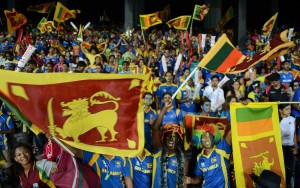Don’t be afraid to take a walk in the park
View(s):A British journalist friend, genuinely impressed with the Lankan style of cricket and also their track record, once quizzically inquired: “I am clearly impressed with Sri Lankans’ style of cricket. You produce cricketers of quality, as a matter of fact. Lankans in the calibre of Kumar Sangakkara, Mahela Jayawardena, Sanath Jayasuriya, Muttiah Muralitharan and even Chaminda Vaas are cricketers who held the world stage in awe. Yet, your country is a little bigger than a Caribbean island. In the West Indies they need a host of such nations to field an eleven. Your cricket is based on a club structure, which in England we do not have the time for. Your cricket I heard is based mostly around your capital city Colombo. Besides, your cricket administration is financially not viable.

Once Sri Lanka won the cricket world cup in 1996, the passion for the game of cricket was converted to fanaticism
“Yet, you keep on doing it, producing good enough cricketers to be very competitive at the highest level on field, year in year out”.
I did not let that English ‘doosra’ hit my stumps. I replied in a very English manner. “For instance, take your own constitution. It is not embedded in one single written document. It is a series of acts that meandered through your parliamentary system, yet your country is one of the biggest democracies in the world. This means your constitution has been carried through by your people with passion over a period of time. That is why that system works well in your country.
“Likewise, cricket, though it was a legacy left behind by the British Raj, got into the system of the Lankan people. Generally, one of the first toys that a little boy in Sri Lanka is introduced to is a plastic cricket bat.
“Cricket, once introduced to the Lankans mainly by the English missionaries in the latter half of the 19th century through the schools system, caught on. It was the in-thing and was accepted by the ruling Britons. Then to prop Sri Lankans’ interest in cricket, the mainly Lankan clubs like SSC, NCC, Tamil Union and the BRC evolved. Ironically they sprang up in the capital because cricket for these lads was only a part-time affair. They had to be employed to be in the game and the jobs were in Colombo. As a result the club system in Sri Lanka took deep root. Even the main cricket playing schools were based in Colombo and the playing gentry had to converge on the capital city to be in the game. This is the system that evolved up to the time Sri Lanka received full-member status in the ICC in 1981.”
I told my British friend that sport-wise the Lankans were multitalented though they lacked the facilities that the more affluent countries enjoyed. But, that fact does not keep away the young in Sri Lanka from taking to sport. Not only cricket, I reminded that a Sri Lankan female athlete in Susanthika Jayasinghe won a silver medal in the Olympics. Generally the female sprint medals are a preserve of the Western world and not Asia.
 I also pointed out that once Sri Lanka won the cricket world cup in 1996, the passion for the game of cricket was converted to fanaticism and it began to spread into the cross-section of the entire island.
I also pointed out that once Sri Lanka won the cricket world cup in 1996, the passion for the game of cricket was converted to fanaticism and it began to spread into the cross-section of the entire island.
And now the cricket visionaries were looking at ways of converting the game into a broad-based provincial system. Yet, the very deep roots in the prevailing club system latch on to its position, thwarting any moves to dilute it with any other doctrines.
The rest of this narration is based upon the above.
It is prudent to have the notion that a vision like the Provincial System would take the game out of its Colombo hold. But certainly, it will not work in toto with the prevailing system.
The thought is the Provincial system should take precedence as it is the module that the Lankans hope to follow, so that the country would have a system akin to the ones that exist in other top cricket playing nations. Yet, with an administration voted in by the clubs, the provincial system will never be elevated to its expected position. Sri Lanka has been trying out with the Provincial Cricket Tournament for the past decade or so, only to take two steps back while they are only contemplating taking just one step in the direction of the Provincial doctrine.
Now Sri Lanka Cricket is identifying certain cricketers and pay them a stipend to keep them in the game. I feel this move should be directed towards the Provincial doctrine. The Provincial teams should be identified and the respective cricketers should be drawn in and all such cricketers should be paid by the administration so that they would be independent of other chores like working for someone else for a living. They can live in their respective zones of origin and engage in the game. Even the administrative set-up of these provinces should be separated from the prevailing club system. Let the system grow gradually and take root.
So much for the Provincial System — if it is to work, it should be a different process altogether.
Now we learn that the administration is about to change the existing voting system so that more vibrant members in the system would have a bigger say.
Yes, this is one of the best things that could have happened. It was explained that clubs like the SSC and the NCC which are controlling clubs who also contribute to the national cause by producing cricketers of class should have a bigger say than the others.
First, there are so called entities like the Government Services and the Nationalised Services which carry the same number of votes like the ‘contributory’ controlling clubs. Now I may ask: When was the last occasion that such an entity produced a national cap through its own system? It may be a sporadic instance. But do they have a given formula to the national cricket cause. Then, why should they enjoy the same cricketing perks and votes that the contributory clubs enjoy.
Then you get controlling clubs like the Galle CC. They are institutions that possess the facilities to contribute to the national cause, but, due to some reasons they don’t. They also should be identified and given an ultimatum. “Get on the wheel and start driving or lose your status and the vote.”
Then there should be a way that the system could tackle people like Jayananda Warnaweera who hold the system to ransom with their block votes. That is one avenue that the administration should trek-in and find ways of thwarting them. This is the major factor that is taking the prevailing system backwards.
If the administrators are genuinely interested in taking the game forward within the prevailing system, they must be bold enough to take the right measures. It may hurt some individuals, but will take the system to an admirable level.


